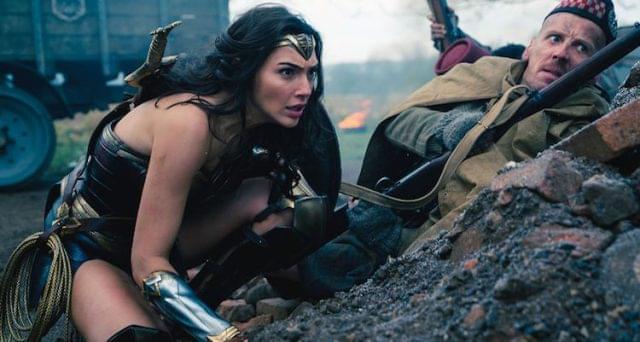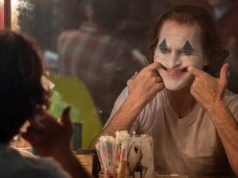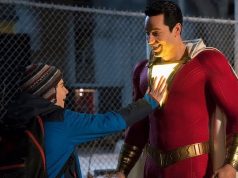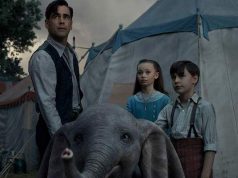
You don’t want to read too much into these things, but after DC Comics’ bleak creative stumbles in establishing a shared movie world — the so-so “Man of Steel,” the bad “Batman v Superman: Dawn of Justice,” and the awful “Suicide Squad” — it turns out all they really needed was a woman’s touch.
“Wonder Woman” finally brings the 77-year-old Amazon princess to the big screen in her own film (her brief appearance was one of the bright spots in “BvS”), and the result is not just one of the better origin stories but one of the most hopeful, positive superhero movies we’ve seen in a while. Directed by Patty Jenkins (“Monster”) from a screenplay by experienced comic scribe Allan Heinberg, the film maneuvers comfortably within the confines of the genre while offering enough that’s new and fresh to stand out from the DC and Marvel pack for reasons not related to gender.
Of course, it stands out for that reason, too, and doesn’t pretend otherwise. Women and men often have different ways of approaching the same problems — not for nothin’, but there’s isn’t much property destruction in this story — and I hope subsequent Wonder Woman appearances delve more into how a heroine’s thinking can be different from a hero’s, and how that can be helpful. Her credo isn’t based on justice, revenge, or strength, but on love. Surely this will have an impact on how the Justice League solves its problems.
The year is 1918, though we don’t know that yet. The lady we will come to know as Wonder Woman (she’s never called that here) is Diana, (Gal Gadot), who lives on a hidden island paradise inhabited by the Amazons, a race of women who were created by the Greek gods and still speak with Greek-adjacent accents. They are extremely well educated in the languages, arts, and sciences of mankind, and they’re aware of men’s biological purpose, but they’ve never dealt with them directly and have no need for them. (No, they don’t sit around all day talking about how much they hate men, either. We’re not on their minds at all, fellas. Sorry!)
“Man of Steel” (2013) B-
“Batman v Superman: Dawn of Justice” (2016) C-
“Suicide Squad” (2016) D
“Wonder Woman” (2017) B+
“Justice League” (2017) C+
Most Amazons are trained as warriors against the inevitable day that the island’s peace is ruptured, but Diana’s mother, Queen Hippolyta (Connie Nielsen), wants a pacifist life for her special daughter. Yet Hippolyta’s warlike sister, Antiope (Robin Wright), sees potential greatness in her niece, especially when Diana exhibits supernatural powers during a training exercise. When an American World War I pilot named Steve Trevor (Chris Pine) somehow stumbles into the island’s protective bubble (this is not explained), trailed by the Germans (ditto), the Amazons find that their arrows and spears, though wielded magnificently and filmed in awesome slow-motion, are no match for the Germans’ guns. Jenkins makes sure we understand how new and horrifying modern weaponry is to the old-school Amazons.
What’s more, upon learning that millions are dying in a “war to end all wars,” Diana believes it must be the work of Ares, the god of war, and that she must fulfill her duty as an Amazon to stop him. Steve Trevor is skeptical about Ares being the cause of the conflict (or existing), but he’s glad to take the fetching Diana with him to London, where he’s working with the Brits to stop the evil German scientists Dr. Maru (Elena Anaya) and Ludendorff (Danny Huston) from developing new poisons.
The scenario is different from most superheroes’ origins. Diana’s abilities are inborn, not acquired by accident or through the use of expensive technology, and she continues to discover them throughout the film. There isn’t a montage where she practices her new skills, or scenes of her thwarting bank robberies. So the film has a different feel to it, a fresh angle. But it also has those satisfying moments we require from our superhero films, including an iconic scene where Diana makes her public debut in full Wonder Woman regalia. Fittingly, this happens at the battlefront, in the area called No Man’s Land.
(Here’s an example of restraint in a series of films that often has none. When Steve tells Diana, “You can’t go out there! It’s No Man’s Land! No man can go out there!” she doesn’t say, “Then maybe a woman can” or “I’m no man” or whatever. She leaves it unsaid and just does it.)
Gal Gadot makes for a stunning, enigmatic heroine, a warrior-princess with regality, grace, and warmth under her fierceness. Chris Pine is a good foil and comic relief. There are delicious, pulpy details like Dr. Maru’s haunting face mask (covering a ghastly injury) that give the story some texture, as well as appropriate emotional beats like Diana’s farewell to her mother. These outweigh the film’s flaws, which include bafflingly bad CGI and a messy final act (which, to be fair, is typical of the genre). There’s some inconsistency in how Diana is written, too. She’s trained in combat yet naive about war, thrown by the word “front” in a battlefield context despite knowing hundreds of languages.
Jenkins doesn’t lean on it too hard, but there’s a recurring motif of people (usually Steve Trevor) telling Diana that she can or can’t do something, and Diana disregarding them. One key moment has her saying flatly, “What I do is not up to you.” That response from nearly any other superhero would be either uncharacteristically impolite or, in the case of someone like Iron Man or Batman, typically arrogant. From Wonder Woman, though, it feels righteous and proper. She has lived her life without ever seeing a man, let alone being bossed around by one; she’s more powerful than the man trying to tell her what to do now; there is no earthly reason for her to obey him or for anyone to expect her to. But she doesn’t make any speeches about feminism or equality or other principles, either. She doesn’t need to. She embodies them.
B+ (2 hrs., 21 min.; )





